Prosecution’s comments at Ethan Crumbley hearing could be risky for case against parents
In seeking to ensure that school shooter Ethan Crumbley is locked up for the rest of his life, the prosecution argues he was not mentally ill, delusional or psychotic, but knew what he was doing.
In charging his parents, however, the same prosecutors assert that James and Jennifer Crumbley knew their son was depressed and hallucinating, yet ignored his pleas for help, never took him to a therapist and bought him a gun instead.
This discrepancy surfaced at a crucial hearing last week to determine the teenage shooter's fate as prosecutors challenged defense experts’ claims that Crumbley was mentally ill and asking for help, but never got it. As one prosecutor argued, even in the hours before killing four students and injuring seven other people at Oxford High School in November 2021, the boy showed no signs of being in distress in the counselor's office, when his parents were summoned over a troubling drawing he had made.
"He doesn’t ask for help. If he would have just said, 'Mom and Dad, I need help,' or, 'I feel like there's no hope, I even brought a gun to school,' They would have given him help, wouldn't they?'" Assistant Oakland County Prosecutor David Williams argued in court.
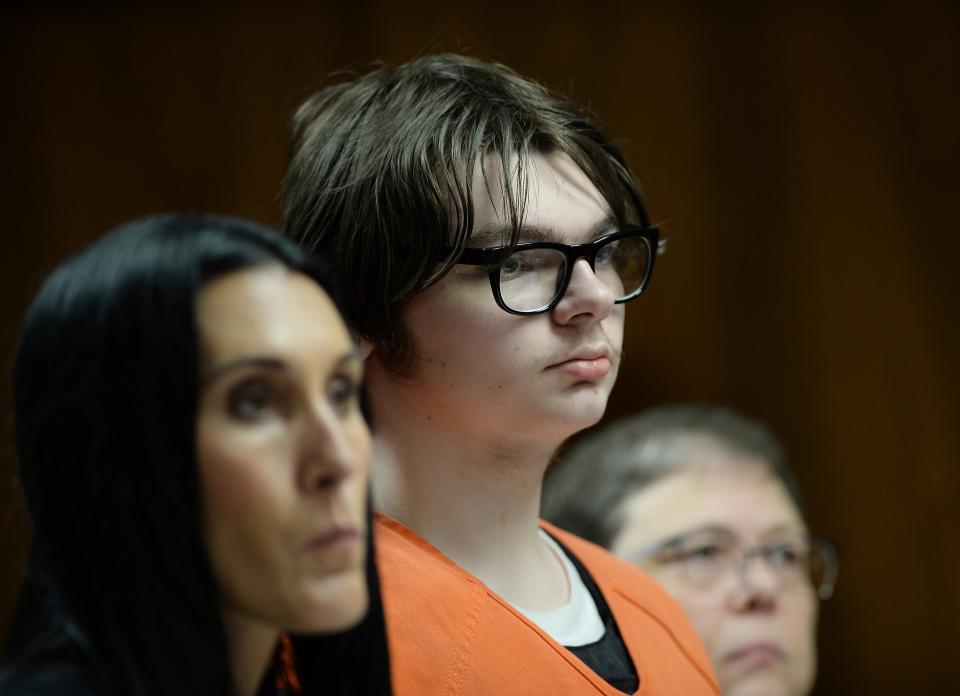
That's precisely what lawyers for James and Jennifer Crumbley have long argued: that it was impossible for them to know their son was going to shoot up his school that day, and that he alone is responsible for the murders of four students — not them.
The Crumbleys, who bought their son the gun he used in the shooting, face involuntary manslaughter charges as the first parents in America charged in a school shooting. Prosecutors allege they ignored a disturbed son who showed many signs of being troubled — such as texting his mom about hearing voices and seeing demons throw bowls around the house — and instead of getting him help they bought him a gun.
Prosecutors seen as 'talking out of both sides of their mouth'
But when psychological experts argued the same thing last week during the hearing to determine whether Crumbley should serve life without the possibility of parole, the prosecution pushed back and challenged assertions that untreated mental illness and bad parenting were factors that led Crumbley to shoot up his school.
"It clearly looks like the prosecution is talking out of both sides of their mouth," said veteran criminal defense attorney Mike Rataj, one of several legal experts who believe the prosecution is sending mixed messages in the Crumbley family legal saga.
As multiple experts point out, when it comes to seeking a life-without-parole sentence for Crumbley, the prosecution maintains that the teenager did not suffer from mental illness — as defined by law. But when it comes to convicting the parents, prosecutors maintain the shooter did suffer from mental illness.
Seasoned criminal defense attorney Art Weiss likened the legal maneuverings to politics.
"It's the typical politician. … They're arguing different positions depending on the audience," Weiss said of the Oakland County Prosecutor's Office. "They’re selecting what they want to select to sentence the child. And then they select what they want to select to convict the parents. But it's the same child, same parents. And you're trying to slice it up like a salami. And it shouldn't happen."
Weiss is referring to the prosecution's strategy at Crumbley's Miller hearing, a mandatory proceeding for juvenile killers who might face life without parole. Crumbley was 15 when he went on his rampage at Oxford High on Nov. 21, 2021. The prosecution, in its quest to lock Crumbley up forever, argues the teenager methodically planned the shooting, wrote about it in his journal, recorded a manifesto about it the night before, strategized who he would shoot first and even plotted to stay alive so he could witness the suffering.
Prosecutor: Crumbley's family life is only part of the story
The Oakland County Prosecutor's Office declined comment for this article, citing the pending case. A gag order in the parents' case also prevents both sides from making public statements about it.
But in her opening statements at the Miller hearing, Oakland County Prosecutor Karen McDonald acknowledged Crumbley's home life is an issue in his case, stating:
"This defendant’s home life is absolutely a Miller factor, and it’s a mitigating factor in this case. But it’s only one factor, and when you look at the offender and the offense, it does not change the fact that life without parole is appropriate."
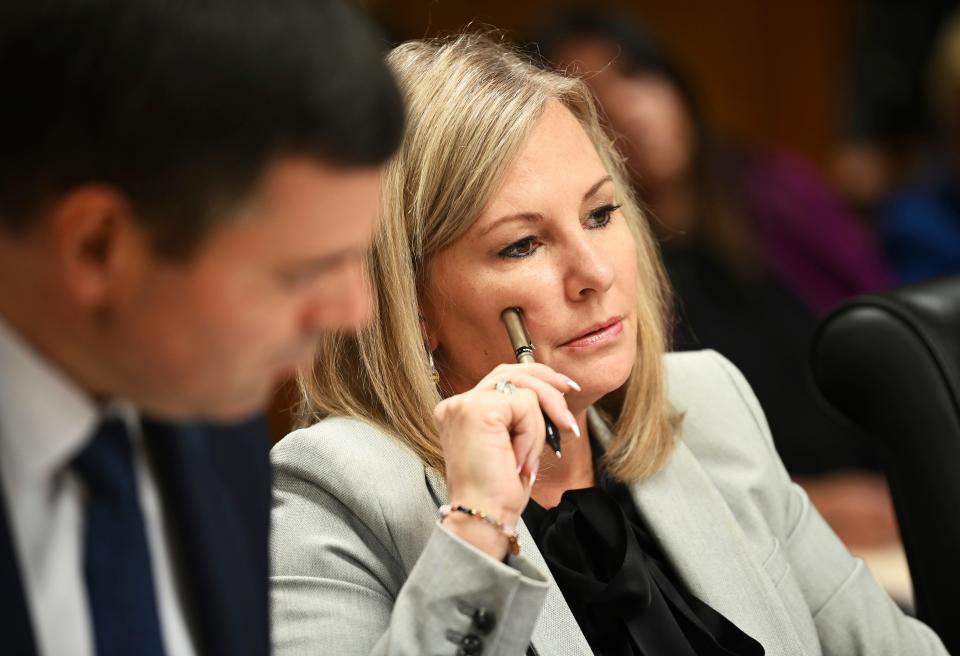
She also addressed the difference between the parents' and son's cases, noting the son was the one who pulled the trigger and has already pleaded guilty to murder and terrorism.
The parents, she said, are charged for their "gross negligence in buying the obviously troubled son a gun, for not securing it safely, and then for not doing anything about it when they saw the defendant’s drawings on the day of the shooting.
"They are not charged for being bad parents, and no one is saying they pulled the trigger," McDonald said. "What we’re saying is they had an obligation to the students who died, and their gross negligence resulted in those students’ deaths."
She continued:
"Neither one of them gets a pass because of the acts of the other. ... Each of them is only being held accountable for their own actions. "
What the prosecutors said in court
Under the law’s definition of mental illness, prosecutors argue, Crumbley was not mentally ill, and knew right from wrong at the time of the shooting.
However, Weiss warns that the prosecutors’ comments at Crumbley's Miller hearing could come back to haunt them in the parents’ case, where prosecutors have made the following comments in open court and in court documents:
“These parents knew he had reported hallucinations … (and) had asked to go to the doctor … They did nothing.”
“They knew their son was depressed.”
“Instead of getting him help, they bought him a gun.”
As Weiss noted, the defense could hold up what the prosecution has said in the son’s case — that he is not mentally ill — and use it against them.
Former federal prosecutor Mark Chutkow sees a similar risk.
"The prosecution will need to be very cautious and precise in its language describing Ethan Crumbley’s condition because the attorneys for his parents will quote those words back in their own criminal proceedings — both to the judge overseeing their case and perhaps when cross-examining mental health experts the prosecution might call," Chutkow said, adding the prosecution" presumably has given thought about how to walk that fine line."
According to Chutkow, who ran the Criminal Division in the U.S. Attorney's Office in Detroit, the prosecution's arguments at Crumbley's Miller hearing may limit its ability to later argue that the parents knew their son had delusions or other signs of severe mental health decline.
"But even with that limitation," Chutkow said, "the prosecution still might be able to argue that the parents knew he was exhibiting increasingly dark and disturbing thoughts, putting them on notice that he should not have access to a dangerous weapon."
The prosecution’s contention that Crumbley is not mentally ill came through during its cross-examination of psychologist Colin King, one of multiple defense experts who testified that mental illness and bad parenting were factors in the shooting. King diagnosed Crumbley with major depressive disorder and psychosis.
'That person has a serious thought disorder'
During King’s testimony, a prosecutor grilled him about his findings and pressed him to explain why Crumbley behaved in a seemingly normal manner on the day of the shooting — when he surrendered, and afterward at the police station.
As the prosecutor noted, another psychological expert concluded that Crumbley was not mentally ill, did not engage “in unusual behavior that would be typical of psychosis in or around” the shooting, and did not mention demons, paranoia, hallucinations or delusions following his arrest.
King said he disagreed with that expert’s findings.
During cross-examination, King also would not budge from his position that Crumbley suffers from mental illness.
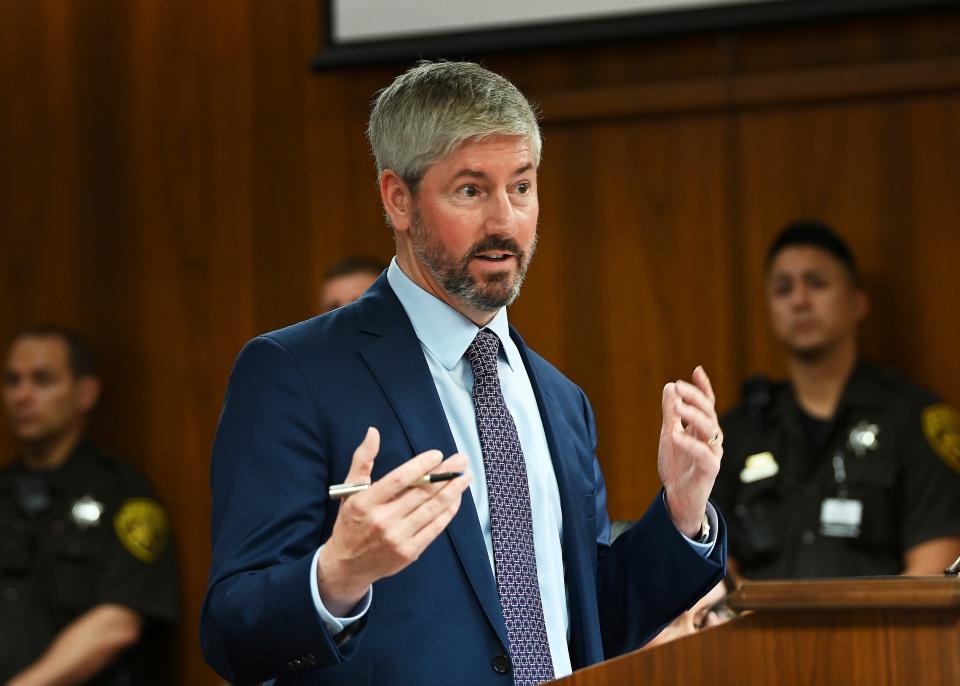
“We all saw the video, sir,” King said of the manifesto that Crumbley recorded on the night before the shooting. “We listened to him saying, ‘I am the demon.’ … For someone to verbalize that tells me that person has a serious thought disorder. I would say you have some serious issues."
King, though, believes Crumbley can be rehabilitated, and should have the opportunity to prove that one day. So does the teenager’s lawyer.
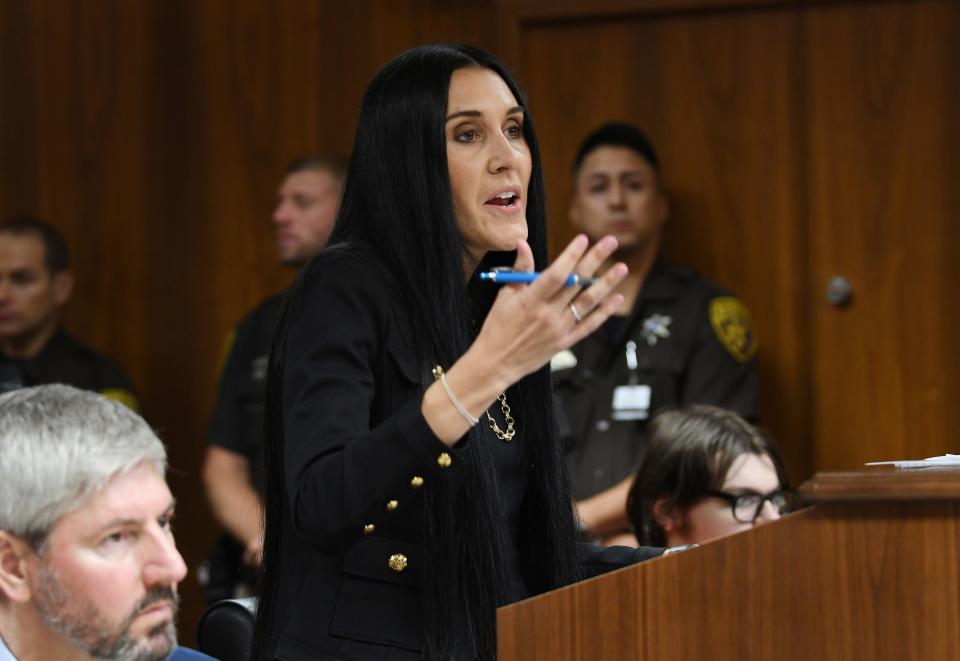
“(He is) not one of those rare individuals who is irreparably corrupt and can’t be rehabilitated,” defense attorney Paulette Loftin argued at the Miller hearing as she fought to spare her client from a life without parole sentence. "The fact that it's a vile crime itself is not enough."
The parents, meanwhile, are accused of more than ignoring a troubled son. According to the prosecution, the parents — more than anyone else — could have prevented the massacre had they disclosed to the school that their son had access to a gun on the morning they were summoned to the counselor’s office over a troubling drawing the boy had made in class.
But they didn’t. And that amounts to gross negligence, McDonald has argued repeatedly.
As she said two days after the shooting: "While the shooter was the one who entered the high school and pulled the trigger, there (were) other individuals who contributed to the events on Nov. 30, and it’s my intention to hold them accountable as well.”
But lawyers for James and Jennifer Crumbley argue the novel charges are overreaching and should be dismissed.
Defense attorney Shannon Smith, who is representing the mother, has long argued that there is no evidence anywhere that Ethan told his parents that he planned to carry out a mass shooting, nor is there any evidence that the parents knew he would do this.
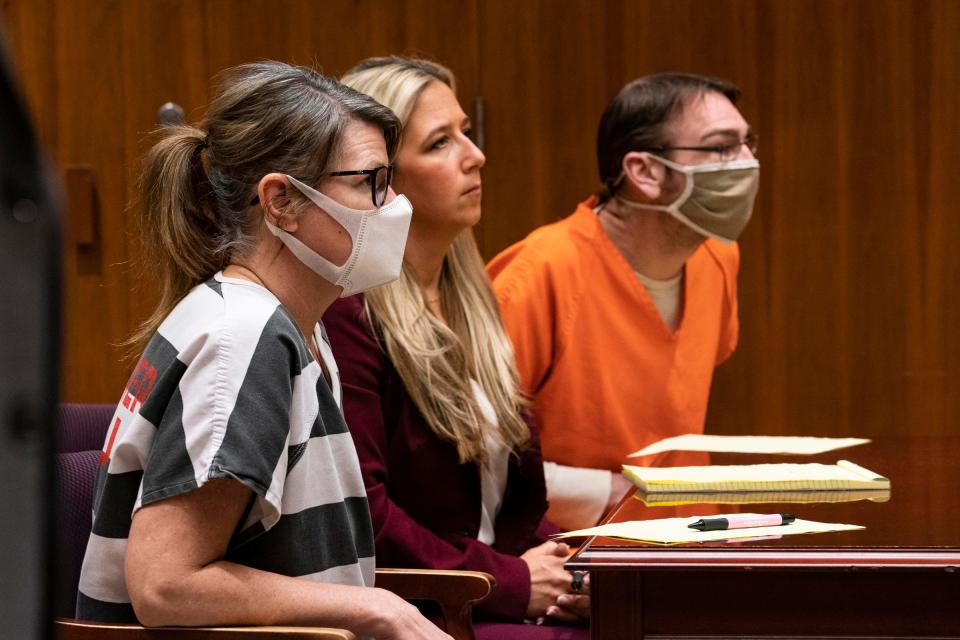
"The element that they can never prove is that Jennifer and James Crumbley knew that their son was going to commit the school shooting," Smith has previously argued in court documents. "The prosecution knows this, which is why they stretched hard to make these people look like the worst parents in the world."
Attorney Mariell Lehman, who is representing the father, has echoed similar concerns, stating in court documents:
"Certainly, after every school shooting, the media and those affected are quick to point to so-called 'red flags' that were missed by those in the shooter’s life. But the truth of the matter is, one cannot predict the unimaginable.”
Ethan Crumbley's disturbing journal
Smith also has argued that it was the teenage son who terrorized a school with deadly violence, not the parents.
“As made clear by his 21-page journal, (Ethan) did not, in the spur of the moment, embark on the homicidal rampage; to the contrary, (he) planned the attack well in advance,“ Smith writes, stressing the parents had no way of knowing this.
Crumbley’s journal is playing a key role in the sentencing phase of his case as prosecutors argue the teenager’s own writings highlight the horror he methodically planned and carried out.
In his journal, he wrote that he would carry out the biggest mass shooting in Michigan history, how the first victim had to be a pretty girl, how he wanted to live so he could witness the suffering and experience the fame he so badly wanted.
"This is an offense unlike any this country has ever seen … the picking and choosing of who would die," McDonald argued at the Miller hearing. "The way he researched and planned the shooting … he stated over and over, 'I know I’ll spend the rest of my life in prison.' … He wanted to stay alive because he wanted to witness the suffering he created."
All of this, the lead prosecutor argued, is why Crumbley's case is that "rare" case that warrants life without parole.
Defense experts disagree.
"I don’t think that any juvenile should be sentenced to life without the possibility of parole" Rataj said. "He's a boy. the male brain doesn't develop until 25 years old. And yes, he’s going to have to be punished. But should he die in prison? I say no."
"Can he be rehabilitated?" Rataj added. “It remains to be seen. But that door should not be closed on him."
'The kid never had a chance'
Weiss, who has represented several juvenile lifers — including one he recently helped free — agreed, and noted that the judge must consider multiple factors in deciding whether life without parole is appropriate. The heinous nature of the crime is not enough, he said, adding the judge also has to consider Crumbley’s age, level of maturity, family life, and potential for rehabilitation.
More: Ethan Crumbley's former neighbor opens up: He ‘didn’t have a prayer as a child’
As for his family life, Weiss said: “The kid never had a chance. The parents are what they are.”
As for rehabilitation, he said: “You gotta find out whether the person can be rehabilitated, and so far nothing has been introduced that says he cannot be.”
Tresa Baldas is an award-winning courts and legal issues reporter and was named the 2020 Richard Milliman "Michigan" Journalist of the Year by the Michigan Press Association. Contact her at tbaldas@freepress.com
This article originally appeared on Detroit Free Press: Crumbley prosecutors argue both sides of key mental illness issue

